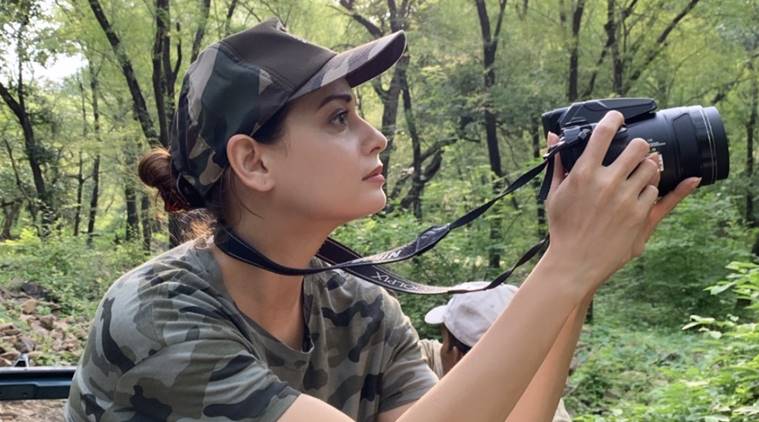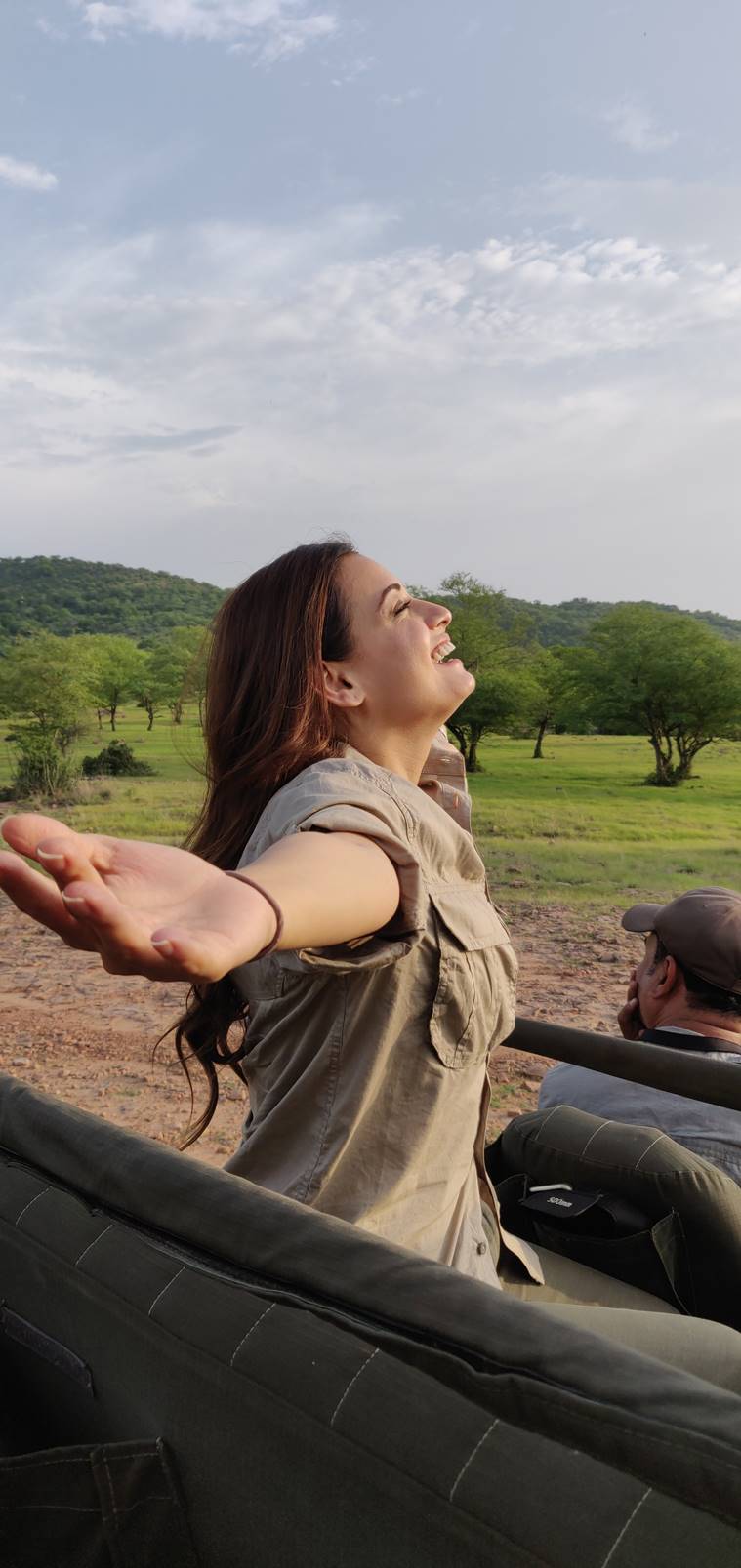 “I believe we will come back to the inner belief that all life is connected and that we will do the right thing”.
“I believe we will come back to the inner belief that all life is connected and that we will do the right thing”.
“यां रक्षन्त्यस्वप्ना विश्वदानीं देवा भूमिं पृथिवीमप्रमादम्”
(Yaam Rakssanty[i]-Asvapnaa Vishva-Daaniim Devaa Bhuumim Prthiviim-Apramaadam)
I meditate on the Earth Who is sleeplessly protected by the devas with vigilance because She is Vishva-Daaniim (All-Giver) and all life-forms depend on Her.
(Bhoomi Sukta verse 7: From Atharva Veda)
Happy Earth Day!
Yes, we must be grateful for the rich inheritance of being born on a planet that supports such an extraordinary abundance of life forms. This pale blue dot, the biosphere, forests, oceans, rivers, lakes, deserts, mountains, flora and fauna, so rich, so diverse, all and ever giving — connecting all life is, in fact, our only home.
This is the 50th year of the ‘Earth Day’ movement started in America on the 22nd of April 1970 by environmental advocate Denis Hayes. A movement that has become one of the largest global-civic events responsible for fighting environmental ignorance.
“Despite that amazing success and decades of environmental progress, we find ourselves facing an even more dire, almost existential, set of global environmental challenges, from loss of biodiversity to climate change to plastic pollution, that call for action at all levels of government,” said Hayes.
Over the last 50 years millions of people that have gathered outdoors on Earth Day in protest and action to serve our planet, have now been forced to remain indoors by the Covid19 pandemic. So have the rest of the people who didn’t care to respond to the urgent warnings by environmental crusaders. Everything has shut down. Airlines, trains, industries, factories, lives have come to pause. The air is cleaner, the streets are quiet, the birds are being heard and people are discovering ways to cope with this new way of life. Now that they themselves are alone at home, many notice how simple things in life are good enough. There are millions of people who find themselves more vulnerable than ever before. Many notice how painful it must be to hold animals captive in isolation.
Few if any of us believed that within our lifetime we would collectively witness such a shared catastrophic human crisis? The scientists have spent years informing civil society and governments about the catastrophic consequences of human activity that has altered almost 75 percent of the Earth’s surface! But this, what the world is collectively experiencing, had actually been predicted by scientists, but they were ignored. Today we are collectively paying the price for this error in our ways.
 Dia at Ranthambore National Park.
Dia at Ranthambore National Park.
This despite the raging forest fires, the rapidly melting glaciers, extreme weather events that are causing human misery through droughts, floods, and the contamination of our water, air and food. Basically, we are destabilising life, and destroying lives and livelihoods of millions. For now, the fact is that the unempowered are paying the greatest price, but, as COVID19 demonstrated, not even royals and country heads are going to be spared. And the consequences of the disruption of human societies will be geometrically greater than the disaster we are facing at the hands of COVID19.
The fact is that we cannot go back to business as usual or we may not have any businesses, large or small, to go back to. That is the simple truth that this global lockdown has underscored for us. As Lord Nicholas Stern from the London School of Economics so often reminds us: “The economy is a wholly-owned subsidiary of the environment.”
Let me explain the connection between Coronaviruses and Nature.
According to scientists, 75 percent of new and infectious diseases are zoonotic, namely ones that originate from pathogens transferred from animals to humans. The drivers of zoonotic disease emergence are largely caused by environmental change – usually a result of human activities. To put it simply, they are human-induced. Destruction of wildlife habitat and forests, mining and industrial farming have lead to environmental changes that modify wildlife population structure and reduce biodiversity, resulting in new environmental conditions that cause the emergence of these diseases. By some estimates, these lead to over a billion cases of illnesses, resulting in millions of deaths year after year.
With 68 percent, (two-thirds) of the global population is projected to live in urban areas by 2030, imagine how much of the Earth’s surface we would have altered? We have the science, the solutions, the technology and the ability to build a world that can restore ecological balance, provided we truly aspire for a path of growth that reduces inequalities. Developing nations like our own that need to provide health, food, education and employment to her population of 1.3 billion people (second largest population on the planet) will need to swiftly develop the public and political will to ensure we do not allow any further destruction of our natural resources, wildlife habitats and forests. Ecosystem integrity underlines human health and development. Business as usual is not an option. It is a given that the protection of our biosphere is going to determine the future of all nations and their people.
An invisible virus has acted as a leveler, proving to all people that we are not above nature. It is also a stark reminder that if we continue to fail to protect biodiversity and understand the linkages of human health and progress with environment, we will perish.
Fortunately for us, there is still time. Time for us to usher in a ‘Survival Revolution’, founded on nature-based solutions that leverage billions of years of evolution to the advantage of humans.
The theme for this Earth Day, April 22, 2020, is ‘Climate Action’. Interestingly the Paris Agreement, which has had its fair share of broken promises, non-coincidentally, was signed on Earth Day, 2016. The Paris Agreement and the Sustainable Development Goals offered us a roadmap four years ago. COVID19 came as a harsh reminder of the consequences of our ignoring the messages being sent us by the biosphere.
But let me end on a very realistic note. NATURE REPAIRS ITSELF. We have seen that demonstrated dramatically for us in the past couple of months. Billions of people have been reminded of the power of nature to give and to take away. What remains to be seen is whether or not the pandemic that envelopes us all will remain with us as a guidepost of the direction in which we choose to go. I believe we will come back to the inner belief that ALL LIFE IS CONNECTED and that we will do the right thing. Also, that ‘Climate Action’ will flow not only from a lack of choice but also from the empathy and interdependency of humans with the rest of the species with which we share our beautiful, blue planet.
Let’s all learn to be greedy for good!
Dia Mirza is an actor, producer, UNEP Goodwill Ambassador and UN Secretary Generals Advocate for SDGs.